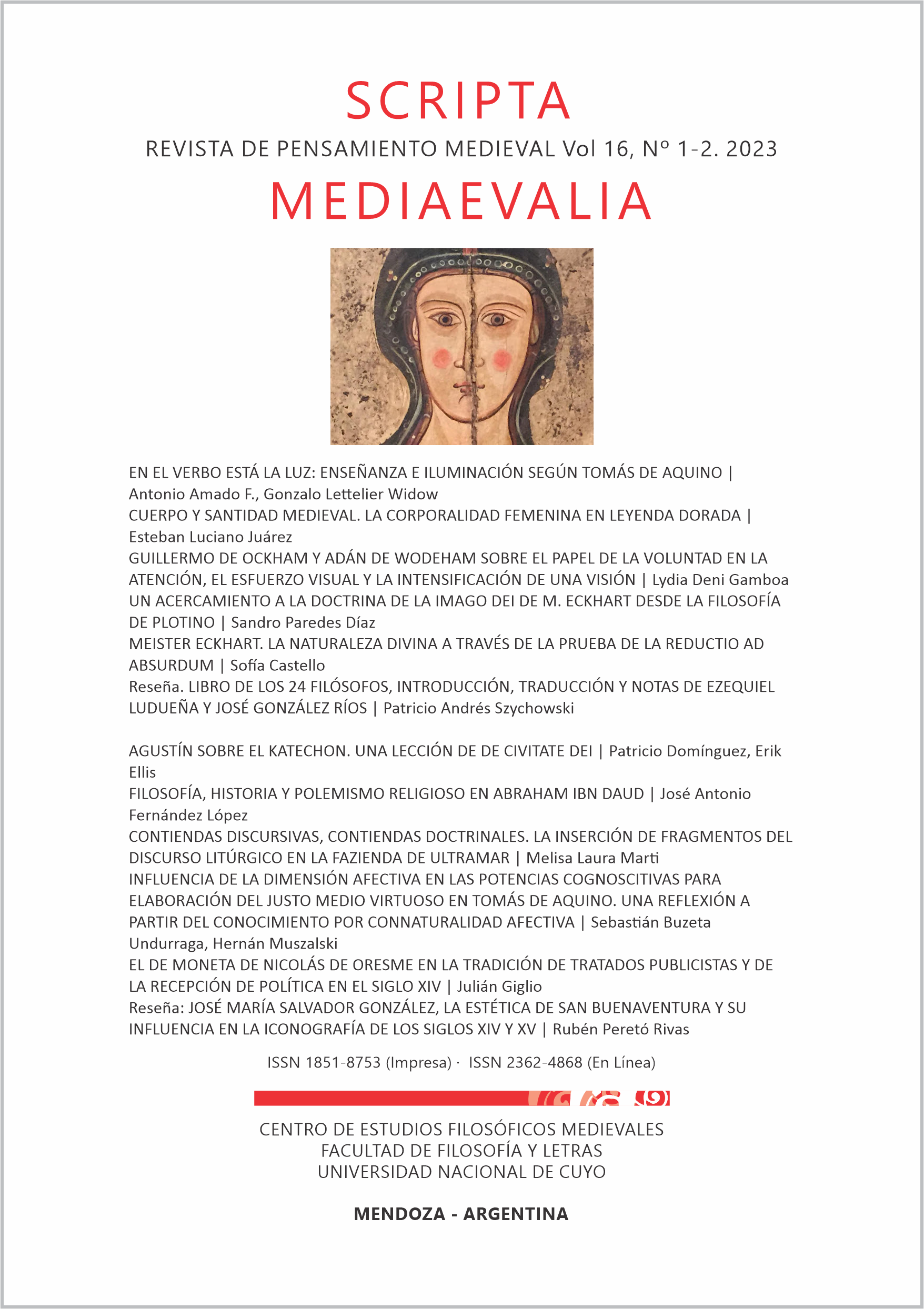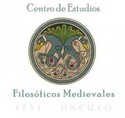En el verbo está la luz: enseñanza e iluminación según Tomás de Aquino
DOI:
https://doi.org/10.48162/rev.35.023Palabras clave:
Gobierno divino, iluminación, enseñanzaResumen
La Suma Teológica de Tomás de Aquino discute el acto de enseñanza en el contexto del gobierno mediato del mundo por Dios, quien comunica su perfección creando seres capaces de comunicarla. El artículo sostiene que la clave para comprender el lugar de esa discusión, que es tan relevante como la misma respuesta, es concebir el acto de enseñar como el modo humano de la iluminación, que se realiza mediante la comunicación de un verbo que lleva consigo, de modo participado, la luz del intelecto agente del maestro.
Citas
Agustín de Hipona. Obras completas de San Agustín. II: Las Confesiones (Madrid: BAC, 1979)
Agustín de Hipona. Obras completas de San Agustín. III: Obras filosóficas: Sobre el maestro, 538-598. Madrid: BAC, 1963. Agustín de Hipona. Obras completas de San Agustín. V: Tratado sobre la Santísima Trinidad. Madrid: BAC, 1956. Armitage, M. “Why Didn’t esus Write a Book? Aquinas on the Teaching of Christ.” New Blackfriars 89 (2008): 337-353.
Blankenhorn, B. “Aquinas as Interpreter of Augustinian Illumination in Light of Albertus Magnus.” Nova et Vetera, english edition 10, 3 (2012): 689-713 Boland, V. “Truth, knowledge and communication: Thomas Aquinas on the mystery of teaching.” Studies in Christian ethics 19 (2006): 287-304.
Chrétien, . L. “Le langage des Anges selon la Scolastique.” Critique 35 (1979): 674-689. Davies, B. “Aquinas and the Academic Life.” New Blackfriars 83 (2002): 336-346. Davies, B. “Aquinas on teaching and learning.” New Blackfriars 95 (2014): 631-647. Elders, L. Éducation et instruction selon saint Thomas d’Aquin. Paris: Parole et silence, 2012.
Emery, G. “L’illumination et le langage des anges chez saint Thomas d’Aquin.” Nova et vetera 85.3 (2010): 255-280.
Farias, D. “Utrum Christus debuerit doctrinam suam scripto tradere.” Divus Thomas 59 (1956): 20-37.
Fosbery, A. La doctrina de la iluminación y el medioevo. Mar del Plata: Universidad Fasta, 2011.
Gilson, E. “Pourquoi saint Thomas a critiqué saint Augustin.” Archives d'histoire doctrinale et litteraire du moyen age 1 (1926): 5-127
Goris, W. “De Magistro – Thomas Aquinas, Henry of Ghent, and John Duns Scotus on Natural Conceptions.” The Review of Metaphysics 66.3 (2013): 435-468. Hahn, M S. “Thomas Aquinas’s Presentation of Christ as Teacher.” The Thomist 83 (2019): 57-89.
Hankey, W. “Participatio divini luminis. Aquinas’ doctrine of the Agent Intellect: Our Capacity for Contemplation.” Dionysius 22, 1 (2004): 149-78. Jordan, M. Rewritten theology: Aquinas after his readers. New Jersey: John Wiley & Sons, 2008.
Kobusch, T. “The Language of Angels: on the subjectivity and intersubjectivity of pure spirits.” En Angels in Medieval Philosophical Inquiry: their function and significance, editado por I. Iribarren y M. Lenz, 131-142. Aldershot, Hampshire: Ashgate Publishing, 2008.
MacIntyre, A C. “Aquinas’s critique of education: Against his own age, against ours.” En Philosophers on education: New historical perspectives, editado por A. Rorty, 93-106. London: Routledge, 2005. Millán-Puelles, A. Léxico Filosófico. Madrid: Rialp, 2002.
Millán-Puelles, A. La formación de la personalidad humana. Madrid: Rialp, 1963. Ozoliņš, . “Aquinas and his understanding of teaching and learning.” En Aquinas, education and the East, editado por T. B. Mooney y M. Nowacki, 9-25. Dordrecht: Springer, 2013.
Ozoliņš, . “Aquinas, education and the theory of illumination.” Educational Philosophy and Theory (2020), doi:10.1080/00131857.2020.1768632.
Peghaire, J. Intellectus et ratio selon S. Thomas d’Aquin. Ottawa: Institut d’Études Médiévales, 963.
Perrin, E. L’attrait divin. La doctrine de l’opération et le gouvernement des créatures chez Thomas d’Aquin. Paris: Parole et Silence, 2019.
Roling, B. “Angelic language and communication.” En A Companion to Angels in Medieval Philosophy, editado por T. Hoffman, 223-260. Leiden-Boston: Brill, 2012.
Rosier-Catach, I. “La locutio angelica dans la scolastique médiévale.” Annuaire de l'École pratique des hautes études 124 (2017): 277-282.
Schumacher, L. Divine illumination: the history and future of Augustine's theory of knowledge. New Jersey: John Wiley & Sons, 2011.
Sherwin, M. S. “Christ the teacher in St. Thomas’s Commentary on the Gospel of ohn.” En Reading John with St. Thomas Aquinas: theological exegesis and speculative theology, editado por M. Dauphinais and M Levering, 173-193. Washington: CUA Press, 2005.
Tomás de Aquino. De Veritate. http://www.corpusthomisticum.org/iopera.html
Tomás de Aquino. Principium Rigans Montes. http://www.corpusthomisticum.org/iopera.html
Tomás de Aquino. Scriptum super Sententiis. http://www.corpusthomisticum.org/iopera.html
Tomás de Aquino. Summa contra Gentiles. http://www.corpusthomisticum.org/iopera.html
Tomás de Aquino. Summa Theologiae. http://www.corpusthomisticum.org/iopera.html
Torrell, J.-P. “«Dieu conduit toutes choses vers leur fin» Providence et gouvernement divin chez Thomas d'Aquin.” En Ende und
Vollendung, editado por J. Aertsen et al., 561-594. Berlin: De Gruyter, 2012.
Valbuena, J . “Introducción al tratado del gobierno divino del mundo (q.103-119).” En Tomás de Aquino. Suma Teológica, 709-716. Madrid: Biblioteca de Autores Cristianos, 1959, tomo III. White, K. “Aquinas on Oral Teaching.” The Thomist 71 (2007): 505-528.
Publicado
Cómo citar
Número
Sección
Licencia

Esta obra está bajo una licencia internacional Creative Commons Reconocimiento-NoComercial-CompartirIgual 3.0.






































